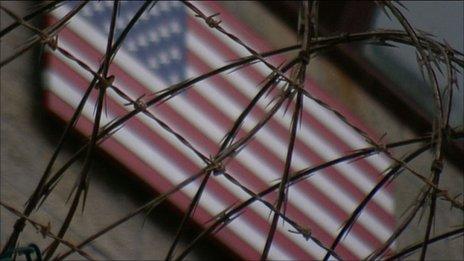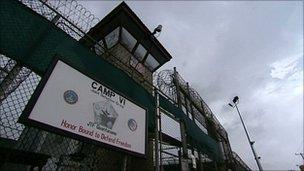Art classes and square eyes at Guantanamo Bay
- Published
- comments

At one tip of Cuba, rough green hills are covered in large cacti and palm trees. Iguanas stand stock still by the roadside. Turkey buzzards wheel overhead.
Then, camps surrounded by high fences, topped with rolls of barbed wire, overlooked by watch towers, incongruously nestled up against the sparkling tropical sea.
Off the coast, boats bristling with machine guns patrol. At one gate the armed guards are backed up by an armoured vehicle, a heavy gun mounted in the back.
This prison has achieved a notoriety to rival the Bastille or Alcatraz, a reputation that has affected America's image around the world.
Nearly 10 years after 9/11 it is still open despite the desire of America's allies and most senior US politicians, including former US President George W Bush, that it should shut.
'Safe, legal, humane'
US President Barack Obama signed an order to close Guantanamo Bay as one of his first acts in office. But it hasn't happened, and it is not likely to any time soon.
Tomorrow I'll be blogging on some of the issues raised by the prison and how 9/11 led to some very basic values of law and human rights being challenged.
But the authorities here are eager to show that whatever happened in the past, Guantanamo is different now.
If I hear the mantra "safe, legal, humane, and transparent" once, I hear it a dozen times.
Inside the barbed wire and series of gates are low prison buildings, shipped in parts from the US and put together like Lego.
Camp Six is dark inside. Through a one-way glass I can see prisoners in a communal area.
It seems to me one man is laying out a mat ready to pray. It turns out, rather mundanely, that he is sorting out his laundry, working out what needs to be washed.
Another man is pacing rapidly up and down reading from the Koran. Another is getting a typing lesson, one leg shackled to the floor.
One of the problems about getting a handle on how much Gitmo has changed is that most of the US military personnel serve only a short time.
I haven't met anyone who'd been here as long as two years.
But the cultural adviser, Zak, has served since September 2005. He started as a consultant and is now a government employee.
A Muslim who left the Middle East when he was 19, Zak says he can straddle two cultures and frequently talks to the prisoners.
He tells me: "This place has changed a lot since I came here. In the past the detainees used to attack the guards a lot, throwing water, faeces, food."
Life-skills programmes
Now, inmates who are, in the jargon, "compliant" are allowed access to their communal areas 24 hours a day. They can watch TV, listen to radio, play Nintendo.
Zak says this is easier on the guards too.
"Some [prisoners] are illiterate - we teach them their own language," he says. "For some of them we introduce life-skills programmes.
"We added art classes which allow detainees to sit down and put their thoughts on a piece of paper.
"It allows them to bring the stress out."
I say that art classes don't fit most people's image of Gitmo.
"Exactly," Zak replies. "Because most people have a certain image and they find it hard to believe anything we say.
"That is why the doors got opened up more to the media. We'd even have people from the government itself who come here and say, 'is this what Guantanamo is?'"
But it was a pretty brutal place, I say.
"I'm not going to comment on that, saying that it's brutal," says Zak.
So I say: "Let me put it as a question: was it brutal?"
"When Camp X-ray was opened up, it was opened in a hurry. Somebody made a call and said, 'we want this opened up'. It was just a cell and people lined up one after another and that lasted less than 90 days.
"Now, answering that word 'brutal'. I wouldn't call it brutal. At that time the blood pressure was high, there was so much anger - 9/11 had just finished - so the mentality was hot.
"It took time for everybody to get used to each other."
Hardliners
But some people were interrogated in a way that just about everybody admits was extreme and many would call torture, I say.

Mark Mardell was not allowed to speak to any detainees during his visit
"I am not the expert in this line," says Zak. "But my role since I came here was to bridge the gap between cultures. I helped in creating a good solid bridge."
He said about 10% of the prisoners are still hardliners.
They argue against the entertainment, the classes and the TV. But Zak says television has changed others.
"Through the window of television they see their own countries," he tells me.
"They see the way things are going and I can tell you about 10% kinda feel sorry that they did what they did. You can see that change."
He adds that they have been watching what has been happening in Egypt, Libya and Tunisia and some now wish their energy had been directed towards similar ends.
"After the death of UBL [Bin Laden] that day, they were glued to the TV like everyone else in the world," Zak says. "After three days it was like nothing had happened.
"They started thinking we swore allegiance to this man, but for the last five years he was living in a house, not hiding in a cave.
"So that sort of doubted his loyalty and that kind of changed the way they think, and think that what is going on right now in the Middle East could benefit them."
Mysterious Camp Seven
It is very difficult to be absolutely certain of what goes on. We are not allowed to talk to any detainees and don't really get much time to see how they live and how they are treated.
There are "non-compliant" prisoners in Camp Five living in solitary confinement and a handful of men, those accused of masterminding 9/11 and the bombing of the USS Cole, in the mysterious Camp Seven.
No-one knows where it is. The president's failure to close the prison has left the administration, and indeed the military, hoping to erase its previous image.
Camp X-ray, where those searing images of prisoners kneeling, chained, in orange jump suits were taken, has closed.
Standing on a hillside overlooking it, I can see trees pushing their way up through the roofs, vines twined around the gates, the watchtowers empty and abandoned.
But with Mr Obama's determination to close it down defeated by a Congress revolted by the idea of trying the detainees on American soil, it may be a long time before nature reclaims Guantanamo as a whole.